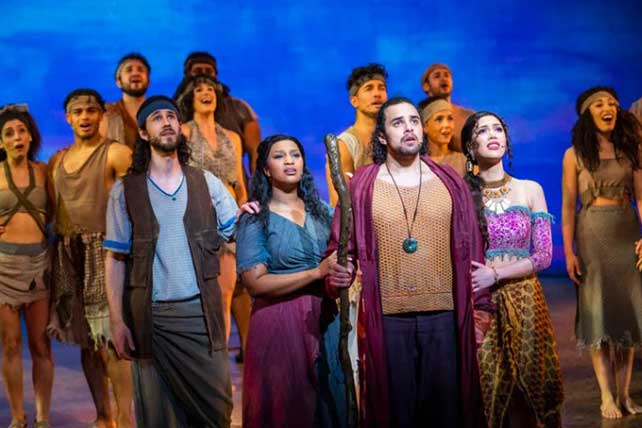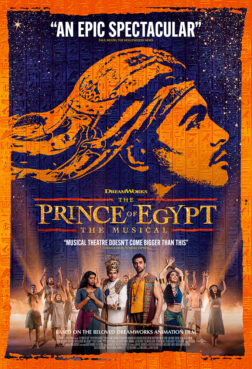(RNS) — Over two decades since DreamWorks’ widely acclaimed 1998 animated movie “The Prince of Egypt” wooed religious and nonreligious viewers alike, a live-action staged version debuted on streaming platforms Tuesday (Dec. 5).
With a book by the film’s original screenwriter, Philip LaZebnik, and 10 additional songs from multi-Grammy and Academy Award-winner Stephen Schwartz (“Wicked,” “Godspell”), the musical adaptation features the same sweeping storyline, iconic characters and beloved songs of the original film. But the story emerges afresh in a new art form, where dancers embody a churning Nile River, convulsing desert sands and the rippling flames of the burning bush, at choreographer Sean Cheesman’s direction.
RELATED: ‘Jesus’ Film Producers Plan Release of New Animated Version in 2025
The adaptation also makes room for viewers to sit in the tragic moments of the Exodus narrative, featuring an almost existential Moses grappling with the death of Egypt’s firstborn sons. Filmed by Universal Studios International in December 2021 at the West End’s 2,000-seat Dominion Theatre in London, the show will be available to rent or buy on YouTube, Xfinity, Prime Video, Apple TV and more. Religion News Service spoke with the show’s director, Scott Schwartz (son of Stephen Schwartz), about the West End production almost a decade in the making. This interview has been edited for length and clarity.
What were some of the challenges and opportunities of adapting this film for the stage?
It was such a wonderful opportunity because it’s just a fantastic film. And it has an amazing score, and it has these great central characters, and it’s an iconic story. I mean, my last name is Schwartz, so as I was growing up, we told the story of Moses and celebrated Passover. So to get to tell this story in a fresh, contemporary way on stage was an amazing opportunity. I think the challenge is, the show is both massive because it’s dealing with an entire people and these major events which are central to all Western religions, and also these geopolitical events. But it’s also a very intimate and very human story. So how to balance the epic scale of this story with these detailed, complicated human relationships was a challenge. But also a wonderful challenge.
You mentioned hearing the story of Passover growing up. Do you have any personal spiritual worldview that informed your approach to directing this show?
Poster for “The Prince of Egypt: The Musical.” (Courtesy image)
What I wanted to do as the director was tell the story for people who are believers and also for people who are not believers. I wanted to imbue the story with as much humanity and as much human truth as possible and honor the story as told in the Bible, but also as told in the DreamWorks animated feature, so you could bring your own set of beliefs to it. And that was really my approach as director.
The cast who voiced the characters in the original film included many acclaimed actors, but they were almost universally white. When it came to casting for the West End production, how did you and your team consider race and ethnicity?
We felt that was very, very important. And we also were creating the show in a different time than the movie was originally created. One of the things that’s beloved about the movie is there are characters on the screen who are of different ethnicities, and different races than maybe a lot of animated features up until that time had been on screen. And so we really wanted to embrace that, and embrace the truth of, what would the racial and ethnic backgrounds of these people be? We tried to cast many actors from very diverse backgrounds, with a focus on actors who had Northern African and Egyptian backgrounds. But we also, of course, wanted to cast actors of Jewish heritage because the story is also a Jewish story. And because this story is so central to cultures all around the world, we also had actors from all over the world. So we tried to find a balance, but we were really proud of where we ended up.
What was it like to work with your father on this show?
We had a wonderful time working on the show together, and we really tried to keep it professional. I was the director. He was the composer. Before the West End, my father came to me after we did the show in Denmark, and he said, I just think we need to see more dance in the second act. I think we need a moment of joy, because in the second act the story gets very, very serious. And we need to see the celebratory nature of these people as well. And he said, What if we create a number that would involve a lot of dance? I got really excited about it and I called (the choreographer) Sean and we talked about what the style of dance could be. And Sean was very interested in sort of a dance that involves sand. And we really built the number “Simcha” together over a course of time, about when the Hebrews find out they have been freed by Ramses the first time.


